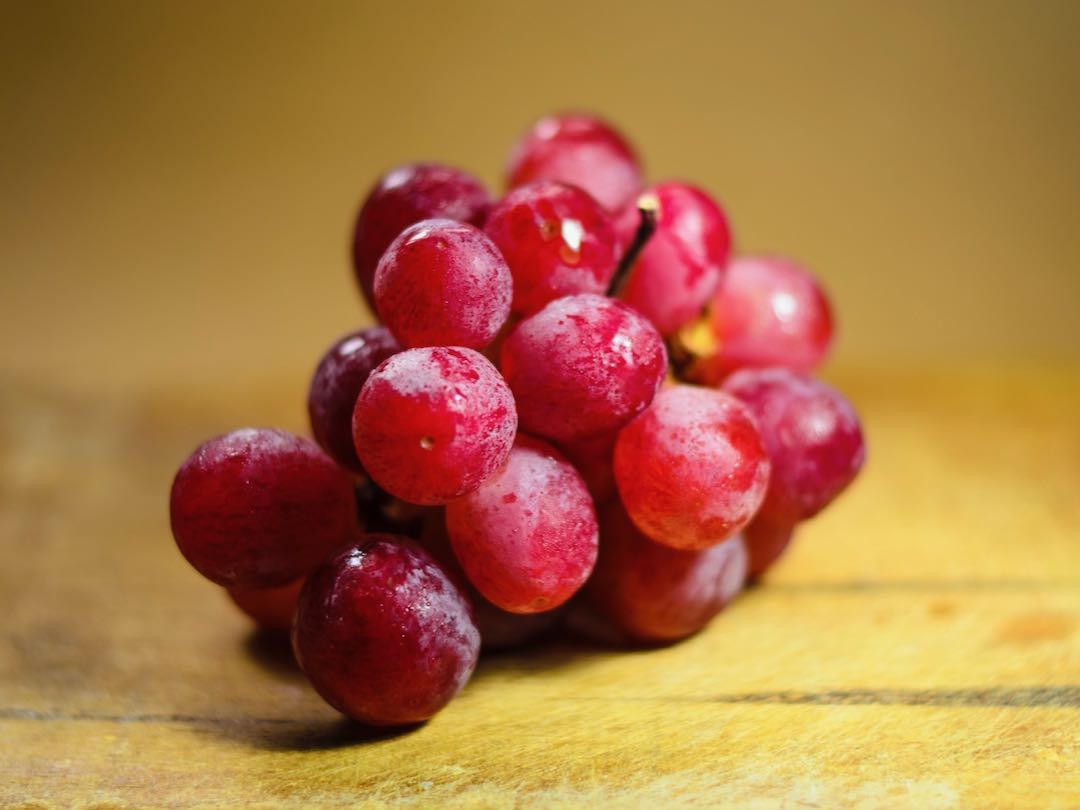On a hot summer’s day, there’s little better than biting into a sweet, delicious, refreshing grape, and the explosion of flavour in your mouth. But can your bunny share in this pleasure? Can rabbits eat grapes safely?
Is it safe for rabbits to eat grapes?
Rabbits can eat grapes safely, but with precautions and in moderation. A medium sized bunny can have a handful of grapes a day as a treat, including seeds. Grapes must be cut in half first, to avoid a choking hazard. Grapes provide some useful nutrients, including magnesium, potassium, copper and vitamin A. But grapes also contain fruit sugars, so too much can upset rabbits’ stomachs, leading to problems including diarrhoea. The main diet for a rabbit should be plenty of hay and water.
Can rabbits choke on grapes?
Yes, rabbits can choke on whole grapes.
You should cut all grapes into half or smaller before giving them to a rabbit (just like nurseries do before giving grapes to toddlers). Whole grapes can become stuck in the throat, preventing breathing.
Sadly, there have been a few reports of bunnies choking to death on grapes that hadn’t been cut up. Although uncommon, it is not a risk worth taking for a few seconds chopping up fruit.
Here is further information on rabbits choking, and what to do.
What are the nutritional benefits of grapes for rabbits?
Grapes are mostly water and fruit sugars, but they do provide some nutrients to rabbits. Here’s a table outlining which nutrients grapes provide:
| Ingredient | Grapes per 100g | Rabbit daily nutritional requirements per 100g of feed | Comments |
|---|---|---|---|
| Water | 79.9 g | ||
| Energy | 80 kcal | ||
| Protein | 0.9 g | 12-17 g | Grapes are low in protein compared to what rabbits need. |
| Fat | 0.23 g | 2.5-5 g | Grapes, as you would expect, are low in fat, which is good as bunnies thrive on a low fat diet. |
| Fibre | 0.38 g | 14-25 g | Rabbits need a lot of fibre in their diets to keep food moving through their digestive system. Without fibre, it all blocks up and creates problems. Grapes don’t provide enough fibre. Rabbits need hay, which is high in fibre, with grapes as an occasional treat. |
| Carbohydrates | 18.6 g | < 20 g | Rabbits need a relatively low carbohydrate diet. Grapes are not low in carbohydrates, and most these carbohydrates are sugar (glucose and fructose). Too much sugar can play havoc with the delicate digestive system of rabbits, allowing bad bacteria to build up and painful gases causing GI stasis. |
| Calcium | 10 mg | 500 mg | Rabbits need a low calcium diet, as they are prone to developing extremely painful kidney stones. Grapes are low in calcium, so are fine. |
| Iron | 0.2 mg | 30-400 mg | Grapes don’t provide the iron that rabbits need in their diets. |
| Magnesium | 7.1 mg | 30-300mg | Grapes provide low levels of magnesium for rabbits. |
| Phosphorus | 22 mg | 400 mg | Grapes provide little of the phosphorus needed by rabbits. |
| Potassium | 218 mg | 6,000 mg | Grapes can contribute a little to the potassium that rabbits need each day. |
| Vitamin A | 100 IU | 1,000-1,200 IU | Grapes provide some of the vitamin A which rabbits need. |
| Vitamin C | 3 mg | None | Rabbits don’t need vitamin C (their bodies make vitamin C). |
| Vitamin D | None | 80-100 IU | Grapes provide none of the vitamin D that rabbits need. |
| Zinc | 0.03 mg | 5-15 mg | Grapes don’t provide enough zinc. |
| Copper | 0.05 mg | 0.5-2 mg | Grapes provide a little of the copper that bunnies need. |
As you can see, grapes provide a little towards the copper and potassium required by rabbits, but mostly they are water and fruit sugars.
What are the dangers of grapes for rabbits?
These are the potential dangers of grapes for rabbits, and how to lower the risk:
- Choking (see above). Lower the risk by chopping up grapes in half or smaller.
- Diarrhoea from excess fruit sugars. Lower the risk by only giving grapes as a treat in small quantities (no more than a few grapes a day).
- Gastro-intestinal stasis (GI stasis). This is a form of constipation that could be caused by the excess sugars in the gut. It is extremely dangerous – if you suspect your rabbit has GI stasis, consult a vet at once. Lower the risk by only giving a few grapes a day to your bunny as a treat, and making sure that their main diet is hay and water.
What is a suitable portion of grapes for a rabbit?
A suitable portion of grapes for an adult rabbit (eg about 6lb) would be up to 10 grapes maximum, but I’d err on the side of caution and give fewer. Remember to chop them up first.
You can include the woody grape vine – this is safe for rabbits to eat. If you are worried about pesticides, also wash the grapes first.
Can you give grapes to baby rabbits?
You should not give grapes to baby rabbits. Their intestines are extremely delicate and still developing. Wait until they are adults before feeding fruit treats.
Can you give raisins to rabbits?
You can safely give raisins as a treat to rabbits. But only give a few raisins – only as many raisins as you would give grapes. There is as much sugar in a small raisin as in a plump grape, so you can only give as many raisins as you would grapes.
Can you give frozen grapes to bunnies in summer?
Yes you can give a few frozen grapes (cut in half) to rabbits on hot summer’s days. It is the equivalent of an ice-cream for them, and many bunnies will appreciate this as a treat.
Grapes for rabbits with cats and dogs in the same house
Be careful if you have both rabbits and cats or dogs in your house. While grapes are safe for rabbits, they can be poisonous to cats and dogs (so can raisins). So either don’t feed your bunny grapes, or make sure that your other pets can’t get anywhere near the rabbit food.
What should rabbits mainly eat?
Rabbits should mainly eat hay and water, with a handful of fresh greens and an eggcup-ful of rabbit nuggets each day. Fruit like grapes can be given as an occasional treat.
Conclusion
Many rabbits will enjoy grapes as a sweet, refreshing treat (just like we do). Just make sure that you only give a few at a time to adult rabbits, and cut up the grapes before you give them.
Check here what other fruit rabbits can safely eat.
This post gives full information about rabbit nutrition.
Find out more about rabbits’ digestive systems here.


